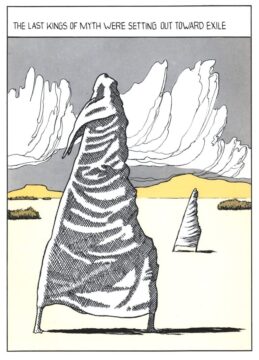Christopher Tayler in Harper’s Magazine:
 In 1983, at the height of his international fame as the author of Invisible Cities (1972) and If on a Winter’s Night a Traveler (1979), Italo Calvino published an anthology of nineteenth-century tales of the fantastic, featuring stories from France, Poland, Germany, Britain, the United States, and Russia. There was one conspicuous absence: Calvino’s own country. To include Italian writers “merely for patriotic reasons” would have been pointless, Calvino explained. Supernatural tales, and fantasy in general, were “very much a ‘minor’ field as far as nineteenth-century Italian literature is concerned.” By implication, the same was true of twentieth-century Italian literature—at least until the genre’s resurgence “in our time.”
In 1983, at the height of his international fame as the author of Invisible Cities (1972) and If on a Winter’s Night a Traveler (1979), Italo Calvino published an anthology of nineteenth-century tales of the fantastic, featuring stories from France, Poland, Germany, Britain, the United States, and Russia. There was one conspicuous absence: Calvino’s own country. To include Italian writers “merely for patriotic reasons” would have been pointless, Calvino explained. Supernatural tales, and fantasy in general, were “very much a ‘minor’ field as far as nineteenth-century Italian literature is concerned.” By implication, the same was true of twentieth-century Italian literature—at least until the genre’s resurgence “in our time.”
Calvino’s anthology was modeled on similar productions by Jorge Luis Borges and a French admirer of Borges’s named Roger Caillois. Like theirs, it offered an intellectual pedigree for the anthologist’s own work. Calvino had no real need to bolster his or the stories’ credentials; some of the playful fables he had written in the Fifties had become assigned texts in middle schools, and other serious writers, such as Primo Levi, had been publishing science fiction collections since the Sixties. But letting himself be playful had caused Calvino a lot of heartache. His first published stories were based on his experiences as a wartime partisan, and he spent a long time trying and failing to write realistic novels about the social problems of industrialized Turin. To their credit, his circle of left-wing editors and critics were unfazed when he pivoted to writing about aristocrats being split into good and evil halves or living out their lives in the treetops. All the same, he never quite stopped dreading accusations of putting form over content. Couldn’t he have stuck to writing about Italian life in a more direct and political way?
More here.
Enjoying the content on 3QD? Help keep us going by donating now.
